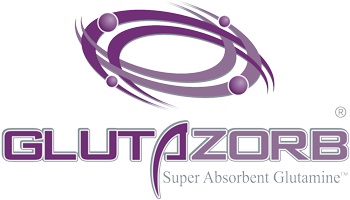GlutaZorb®
US Patent #11,376,282

Studies & Information

What is a glutamine?
Glutamine is the most abundant naturally occurring amino acid in the human body, making up over 60% of all skeletal muscle. Its side chain is an amide formed by replacing a side chain hydroxyl of glutamic acid with an amine functional group. Glutamine is considered a nonessential amino acid since it can be readily synthesized by various tissues in the body.
Where is glutamine found?
Dietary sources of glutamine are found in beef, chicken, fish, eggs, milk, whey, cabbage, beets, beans, spinach & parsley. These are the most abundant sources but traces can also be found in most vegetable juices and fermented foods such as miso. (1)
Some functions of glutamine
Glutamine’s functions are vast which include such things as:
- a substrate for DNA synthesis
- plays a major role in protein synthesis
- primary source of fuel for cells living in the lining of small intestines
- aides in the immune function
- regulates the delicate acid/base balance in the kidneys by producing ammonium (2)
- source of fuel for the brain
- aides in blocking cortisol-induced protein catabolism
- helps to suppress insulin when blood sugar is low
- can reduce the cravings for alcohol
- aiding recovery after surgery
Glutamine has numerous effects in reducing healing time after operations. Clinical trials have revealed that patients on supplementation regimes containing glutamine have improved nitrogen balances, seen generation of cysteinl-leukotrienes from polymorphonuclear neutrophil granulocytes and improved lymphocyte recovery and intestinal permeability. (5)
Why GlutaZorb®?
During intense exercise and times of metabolic stress (which includes injury, illness, dieting, etc) the demand for plasma glutamine dramatically increases. Also, various cells of the immune system (such as lymphocytes & macrophages) depend on glutamine as a primary fuel source. But the enterocytes of the small intestines are the largest consumers of glutamine, accounting for about 40-50% of all body consumption. So, during times of stress it is difficult for the body to supply enough glutamine for these other cell areas, causing depleted glutamine reserves.
Glutamine deficiencies are very common in today’s busy lifestyles and is among the primary tests conducted by doctors who utilize blood tests to ascertain the amino acid levels present in patients who show symptoms of mood swings, chronic illness, and tiredness. As intense exercise increases or everyday stress, glutamine depletion manifests itself in the form of decreases strength, stamina and recovery. So it is very important to use glutamine in a very stable and assimilated form.
Research has shown us (3), that under normal conditions, prior art glutamine supplementation degrades in the stomach at the following rates:
- 30 minutes 2.0%
- 60 minutes 13.0%
- 120 minutes 25.3%
So the need for a stable glutamine exists and Glutazorb® patented technology is the answer.
GlutZorb® is manufactured by All American Pharmaceutical.
References:
- Glutamine (http://www.vitamins-supplements.org/amino-acids/glutamine.php). Vitamins & Health Supplements. Retrieved on October 5th, 2007.
- Textbook of Medical Physiology, Guyton & Hall, 11th edition, p. 393.
- Atlas Bioscience, Amino Acid Digestion Study, June 2006
- Textbook of Medical Physiology, Guyton & Hall (11th edition), p. 393
- Morlion, BJ; Stehle, P; Siedhoff, HP; Koller, M; Konig, W; Furst, P; Puchastein, C. (1998). “Total parenteral nutrition with glutamine dipeptide after major abdominal surgery: a randomized, double-blind, controlled study”, Ann Surg 227